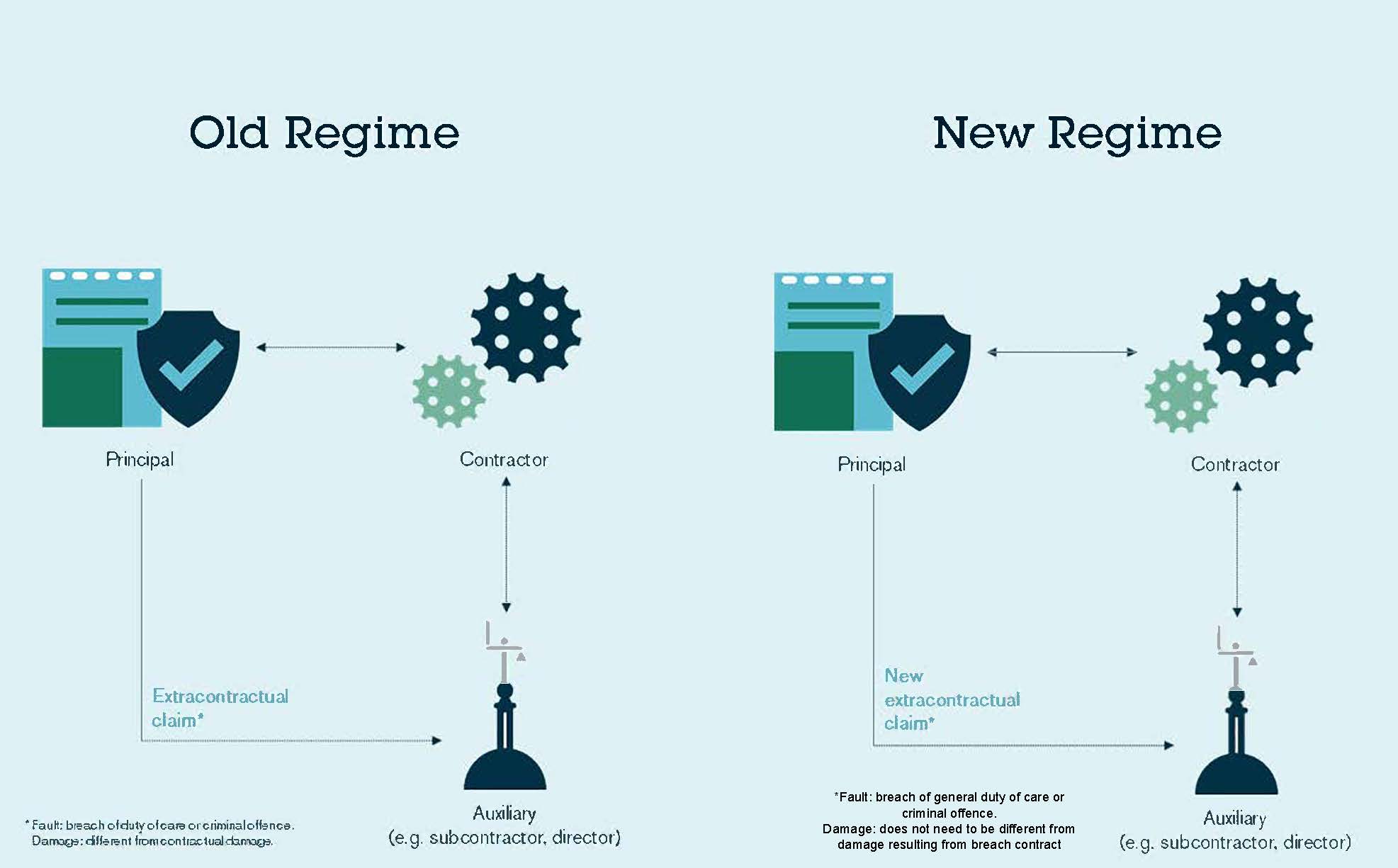Belgium's new Civil Code introduces new extracontractual liability for auxiliary persons
Published on 25th April 2024
Businesses will need to address their liability concerns around auxiliary persons, including directors and employees
The abolition of the principle of quasi-immunity of auxiliary persons and its impact for directors and employees is one of the key aspects of Belgium's reforms of its Civil Code and extra-contractual liability.
In February, the Belgian House of Representatives approved reform of Book 6 of the Civil Code, with its focus on extra-contractual liability which will enter into force on 1 January 2025. The new book comprises 55 articles and replaces, clarifies and modernises the previous law that consisted of only six articles, including new provisions on the duty to prevent damages with implications for tort law and sustainability.
Auxiliary Persons
The reform also introduces new and increased risk for extracontractual liability of the auxiliary person.
The use of auxiliary persons, such as a subcontractor, employee or director, in the performance of contractual obligations is common practice. An example would be a construction company that is specialised in roofing that works as a subcontractor (the auxiliary person or "hulppersoon" or "auxiliaire") for the main construction company, which has a contract with the land owner to construct a house.

Currently, if the auxiliary person commits a fault in executing contractual obligations, causing damage to the principal, the latter cannot launch a contractual claim as there is no contract between the principal and the auxiliary person. Moreover, the principal cannot hold the auxiliary person liable on an extracontractual basis unless the fault constitutes not only a contractual fault but also a violation of a general duty of care or a criminal offence. The damage is different from that arising from the contractual relationship between the principal and the contractor. This is referred to as the quasi-immunity of the auxiliary person.
Quasi-immunity abolition
Article 6.3 §2 of the Civil Code abolishes the quasi-immunity of the auxiliary person and specifies that, unless stated otherwise by the law or the contract, the legal provisions regarding extracontractual (tortious) liability apply to the principal and the auxiliary person.
This means that in the case of a fault by the auxiliary person in the performance of their contractual obligations, the principal is able to launch an extracontractual claim towards the auxiliary person, provided that the fault is at least also a breach of the general duty of care, even though the damage is not different from the damage resulting from the flawed execution of the contract.
In the example of the roofing works, if the roof breaks down because the subcontractor did not use the correct materials or did not attach the roof material properly to the roof construction, the land owner could, under the old rules, not hold the subcontractor liable because the only damage (that is, the breaking down of the roof) results from the bad execution of the contract.
Under the new rules, the land owner will be able to hold the subcontractor liable on an extracontractual basis for not executing its contract correctly; that is, not properly attaching the material to the roof construction even though the only damage is the damage resulting from the bad execution of the contract.
Protection mechanisms
As a counterbalance to the extension of the scope for extracontractual liability of the auxiliary person, the Civil Code provides for protection mechanisms for auxiliary persons (except in case of physical or psychological damage or intentional fault).
These protection mechanisms include the exclusion by special laws or by contract between the principal and the contractor of the possibility of the principal to launch an extracontractual liability claim against the auxiliary person.
The auxiliary person can invoke protective clauses set out in the contract between the principal and the contractor, as well as between the contractor and auxiliary person; for example, deferred payment or indemnification clauses, in response to an extracontractual liability claim.
The auxiliary person can also invoke protective measures under applicable legislation on special contracts and special statute of limitations.
Employees and directors at risk?
Not only the employer but also the contracting party of the employer can now launch a claim (in tort) against employees for faults in the performance of their employment contract. However, employees remain protected by article 18 of the Labour Contract Act under which they will only be liable in case of fraud, serious fault or repeated minor fault.
Article 6.3 of the Civil Code enables the contracting party of a company to launch a direct claim against its directors who did not (correctly) execute the contractual obligations of the company, on an extracontractual basis (which could be interesting in case of bankruptcy of the company).
However, the increased liability risk is tempered by the directors' liability regime set out in the Belgian Code on companies and associations (BCCA), as:
- Directors can only be held liable towards the company's contractual party for an extracontractual fault if this fault is made in the exercise of their mandate and falls outside the range within which a prudent and diligent director in the same circumstances would reasonably act.
- Directors who did not participate to the fault and notified this to other members of the managing body, are exonerated in case of joint liability.
- The liability of directors for "occasional minor faults" is capped to a certain amount.
On the other side, ex ante exonerations or indemnification undertakings by the company (that is, in the relationship between the company and its auxiliary person, the director) that limit or exclude the extracontractual liability of directors are prohibited under the BCCA and, hence, are potentially invalid.
A director can, however, be further protected by
clauses in the contract between the principal and company,
holding harmless commitments of group companies (other than the company or its subsidiaries) and by directors' and officers' (D&O) liability insurance
and professional coverage.
Osborne Clarke comment
We recommend proactively addressing your business' liability concerns as auxiliary person, contractor or principal. This can be done through a due diligence and risk assessment of existing contracts where your business acts as an auxiliary person or where an auxiliary person is involved.
Moreover, insofar as legally possible, parties could include in their existing and future contracts appropriate exoneration, indemnification or other protective clauses that limit or exclude extracontractual liability claims towards auxiliary persons.
Finally, it is advisable to review your professional liability and D&O insurance coverage to ensure that extracontractual liability of the relevant auxiliary person is adequately covered.
This is the third Insight in our ongoing series exploring aspects of on the new Book 6 of the Civil Code.




